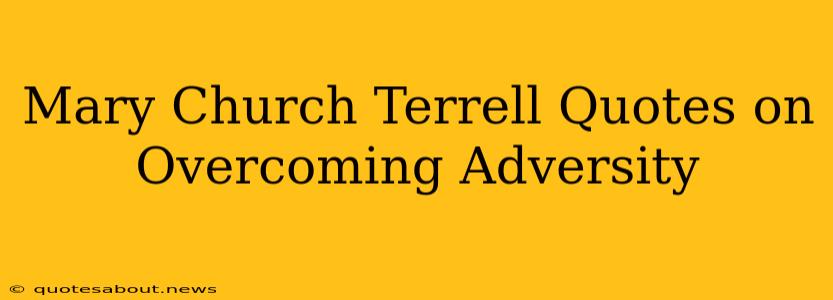Mary Church Terrell, a pioneering African American activist, scholar, and clubwoman, navigated a world rife with racial and gender discrimination. Her life was a testament to perseverance, and her words continue to inspire those facing adversity. This article explores some of her most impactful quotes, examining their context and enduring relevance. We'll also delve into the challenges she faced and how her philosophy of resilience can empower us today.
Understanding Mary Church Terrell's Context:
Born into relative privilege in Memphis, Tennessee, during Reconstruction, Terrell experienced firsthand the rapid decline in Black rights following the end of the Civil War. She witnessed the pervasive racism and sexism of the late 19th and early 20th centuries, facing countless obstacles in her pursuit of education, social justice, and equality. Her unwavering commitment to civil rights, women's suffrage, and social reform shaped her powerful rhetoric and enduring legacy.
What are some of Mary Church Terrell's most famous quotes about overcoming adversity?
This is a crucial question, as it highlights the core message of her life's work. While a definitive list of her "most famous" quotes is subjective and depends on the source, some consistently emerge as particularly impactful and insightful. These often focus on the importance of education, self-respect, and persistent action in the face of oppression. Many of her speeches and writings emphasize the need for Black people to demand their rights and not accept second-class citizenship.
What were the main challenges Mary Church Terrell faced in her life?
Terrell's life was a constant struggle against systemic racism and sexism. She faced discrimination in education, employment, and social circles. As a Black woman, she experienced a double burden of oppression, encountering barriers that white women and Black men did not. Specifically:
- Educational barriers: Access to quality education for Black women was severely limited. Terrell's determination and the support of her family allowed her to overcome this, but it represented a significant hurdle for many others.
- Social segregation: Terrell constantly encountered social exclusion and racial prejudice in public spaces and social gatherings. This constant rejection fueled her activism and desire for change.
- Political limitations: Despite her intelligence and activism, Terrell faced significant limitations in her political participation due to her race and gender. The fight for suffrage and equal rights was a long and arduous battle.
- Personal attacks and harassment: As a prominent activist, Terrell faced relentless personal attacks and harassment from those who opposed her work. This included threats, social ostracism, and attempts to discredit her.
How did Mary Church Terrell's philosophy help her overcome adversity?
Terrell's philosophy was rooted in self-respect, education, and unwavering commitment to justice. Key elements include:
- Education as empowerment: She believed that education was the key to overcoming oppression, providing individuals with the tools to challenge injustice and advocate for their rights.
- Self-reliance and dignity: Terrell emphasized the importance of Black people maintaining their self-respect and dignity in the face of racism. She advocated for self-help initiatives and encouraged pride in one's heritage.
- Persistent activism: Terrell's life was characterized by persistent activism, demonstrating the importance of continuous effort in the fight for equality. She never gave up, even in the face of significant setbacks.
What is the lasting legacy of Mary Church Terrell's work?
Terrell's legacy is one of unwavering determination and a commitment to social justice that continues to inspire. Her work paved the way for future generations of activists and continues to resonate today. Her legacy includes:
- Inspiring future generations of activists: Her courage and persistence continue to inspire those fighting for racial and gender equality.
- Advocacy for education and self-improvement: Her emphasis on education as a tool for empowerment remains relevant.
- Promoting intersectionality: Her experience as a Black woman fighting against multiple forms of oppression highlighted the importance of considering intersecting systems of oppression.
Mary Church Terrell's life and words offer a powerful message of hope and resilience. Her legacy reminds us that the fight for equality is an ongoing process that requires persistent effort, unwavering determination, and a deep commitment to justice. Her quotes serve as a guiding light, reminding us that even in the face of overwhelming adversity, progress is possible through education, self-respect, and collective action.

